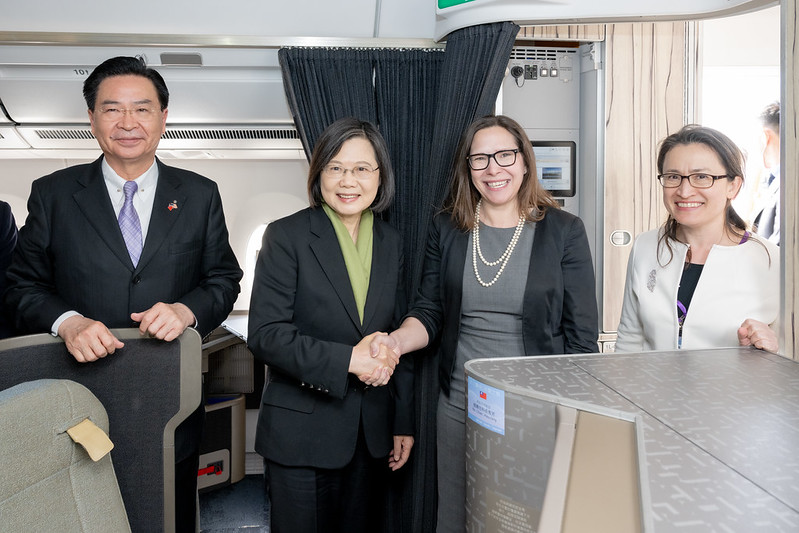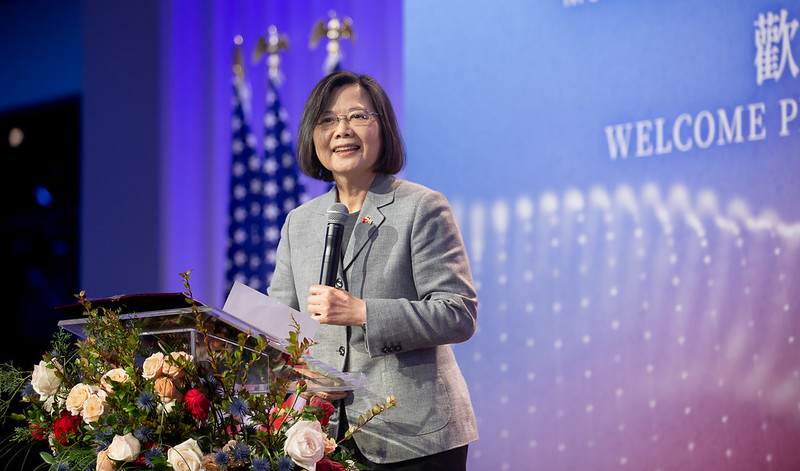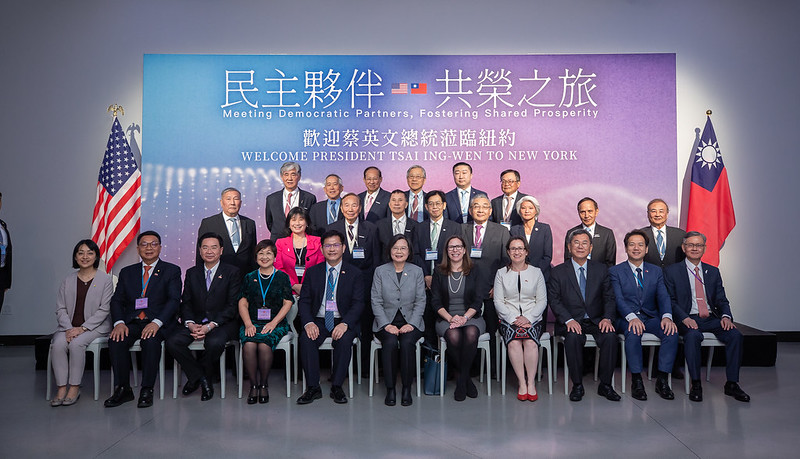News & activities
 News releases
News releases
On the afternoon of March 29 local time (early morning of March 30 Taipei time), President Tsai Ing-wen arrived at New York City's John F. Kennedy International Airport on a transit stop en route to visit diplomatic allies in Latin America, a trip themed "Meeting Democratic Partners, Fostering Shared Prosperity." After being received at the airport by Representative to the US Bi-khim Hsiao (蕭美琴) and American Institute in Taiwan (AIT) Chairperson Laura Rosenberger, the president and her delegation were then driven to her hotel, where they were greeted by an enthusiastic crowd at the entrance.
Later that night, the president attended a banquet with the local and Taiwanese expatriate communities in New York, where she thanked our overseas compatriots for all they have done for Taiwan. This being the president's first trip abroad since the COVID-19 pandemic began three years ago, she took special care to report on the progress over that time. She also stressed that Taiwan stands on the frontline of the global democratic alliance and works together with its democratic partners as it stands fast on the path of democracy and freedom.
President Tsai delivered remarks in English, Mandarin, and Taiwanese. The following is a transcript of her remarks in English:
It is wonderful to see so many American friends here this evening. Governor [Phil] Murphy, thank you for joining us from across the Hudson River. And Deputy Speaker [Raj] Mukherji of the New Jersey General Assembly, New Jersey State Senator Gordon Johnson, and New York State Senator Iwen Chu (曲怡文) for attending.
I am so pleased to stop over here in the United States on my way to Guatemala and Belize, and to have the honor of seeing so many friends here tonight. The enthusiasm of the Taiwanese American community always impresses me.
The bond between Taiwan and the United States is strong today not only because of our common values and shared interests, but also because of the dedication of so many Taiwanese Americans in bridging this relationship. The Taiwanese people have been incredibly resilient, creating a beacon of democracy in Asia, and a robust economy that is an indispensable part of global technology advances. Taiwan has also nurtured generous citizens that have acted as a force for good in the world, always looking for ways to contribute.
At this juncture, our partnerships with the Unites States and other democracies are more critical than ever. I don't need to remind you of the tremendous challenges that we face. And in facing these challenges, we know that we are stronger when we stand together, in solidarity, with fellow democracies.
Taiwan cannot be isolated, and we do not take friendship for granted. We are thankful to all those who stand with us, and we are confident that Taiwan will continue to stand tall, free, democratic, and with dignity.
President Tsai then delivered remarks in Mandarin, a translation of which follows:
This is my first trip abroad since the COVID-19 pandemic began three years ago. Accompanying us on this trip are four of our legislators: Claire Wang (王婉諭), Chen Ou-po (陳歐珀), Chiu Chen-yuan (邱臣遠), and Chen Ming-wen (陳明文). Today, I want to report that during those three years, Taiwan made significant progress and underwent important changes. The first change is that we have steadily built a more resilient Taiwan. The pandemic had a tremendous impact on the global economy. But Taiwan's economy grew despite that challenge. Government revenue increased, and this was actively invested to fund many policies and development projects.
We have seen improvements in our social welfare and care programs, and we are working hard on childcare allowances, higher wages and lower taxes for young people, and a Long-term Care 2.0 Plan for seniors. We have made progress in self-sufficiency for national defense. Domestic production of naval vessels and aircraft, for example, has enhanced Taiwan's self-defense capabilities. We have strengthened our all-out national defense capabilities. Whether for peacetime disaster relief or wartime mobilization, we can deploy our forces with speed and precision wherever they are needed.
We are also addressing post-pandemic economic challenges with post-pandemic special budget allocations to help the most vulnerable small- and medium-size enterprises, disadvantaged groups, and young people, so that we can weather the storm and move toward post-pandemic economic recovery together. In the past few years, Taiwan has also felt the effects of inflation. And so we have approved a special budget, from which we will distribute NT$6,000 to each citizen to help them deal with the extra burden of inflation. Taiwan has the strength and the ability to meet any challenge. Step-by-step, we will build a more flexible and more resilient Taiwan.
The second change is that Taiwan is gaining more international attention, and that the Republic of China (Taiwan) is rising in global importance. Over the past three years, Taiwan's performance during the pandemic has garnered much international attention and praise. And I am certain that, living abroad, you must have sensed that. The people of Taiwan came together to fight the pandemic, and we not only safeguarded the health of our citizens, but when feasible, we offered our assistance to many other countries. And when Taiwan faced difficulties, many countries came to our aid. This virtuous cycle is the result of us democratic partners working together.
Meanwhile, the restructuring of global supply chains was accelerated by Russia's invasion of Ukraine, the US-China trade situation, and various uncertainties. Japan, countries in Southeast Asia, and even many European countries became increasingly inclined to cooperate with Taiwan. As everyone knows, TSMC is setting up a fab in Phoenix, Arizona. This not only reflects Taiwan-US economic cooperation, but also shows that Taiwan's technological prowess is spreading worldwide. As the world increasingly focuses on Taiwan, it also needs Taiwan more than ever. The world is now more engaged with Taiwan, just as Taiwan is engaging more with the world.
The third change is that Taiwan has made important progress in its diplomatic efforts. This is especially true for Taiwan-US relations, which are closer than ever. Taiwan-US relations continue to deepen, and bilateral cooperation in various exchanges, economics and trade, and security has seen significant progress over the past three years.
In the areas of exchange and cooperation, the passage of the Taiwan Travel Act and the issuance of the New Guidelines for U.S. Government Interactions with Taiwan Counterparts have gradually relaxed many of the previous restrictions. And so, in the past few years, we have seen many major figures from a range of different circles in the US make visits to Taiwan, taking concrete actions to show their firm support for Taiwan.
We, too, have taken steps to spur substantive bilateral exchanges in various fields. In education, for example, in 2020 we launched the US-Taiwan Education Initiative. The US and other countries in the Anglosphere are contributing their efforts to our Bilingual 2030 policy, and the US is helping expand our Mandarin education overseas.
In economics and trade, just this past January we completed a second round of negotiations under the Taiwan-US Initiative on 21st-Century Trade. Our goal is to complete talks on this initiative before the end of this year. And Taiwan and the US will continue to engage in successive rounds of the Economic Prosperity Partnership Dialogue to further enhance our partnership.
And in the area of security, we have seen the US Congress in the past few years pass several important resolutions in support of Taiwan strengthening its self-defense capabilities. The Biden administration has so far announced nine arms sales to Taiwan. We thank the US government for continuing to abide by its security commitments to Taiwan in accordance with the Taiwan Relations Act and the Six Assurances, and for supporting Taiwan's efforts to build up its self-defense capabilities. We will most certainly stand alongside the US and other democratic partners in doing everything we can to safeguard regional peace and stability.
We really must show our gratitude to our fellow overseas compatriots for the progress we have seen in Taiwan-US relations. It is thanks to your sustained efforts on Taiwan's behalf that more and more of our friends overseas are hearing what Taiwan has to say. Once again, I thank you for all you have done for Taiwan.
Over the past few years, Taiwan has shown the international community that even while staring down threats and harassment, we neither yield nor provoke. We have demonstrated a firm will and resolve to defend ourselves, that we are capable of managing risks with calm and composure, and that we have the ability to maintain regional peace and stability. More than that, we are absolutely determined to safeguard the values and the lifestyle to which we have dedicated ourselves.
Taiwan stands on the frontline of the global democratic alliance. As our people become more united, the more secure is our nation. And as Taiwan becomes more secure, so does the world. We intend to cooperate with all our democratic partners. Taiwan will stand fast in its commitment to freedom and democracy.
I firmly believe that all our fellow overseas compatriots support Taiwan becoming more engaged with the rest of the world. And in that regard, you are our warmest, strongest, and firmest supporters. And finally, I want to thank you all once more for your support. We will spend the next few days in Guatemala and Belize continuing to do our utmost for Taiwan's diplomacy. Let each of us do all that is in our power to help Taiwan secure a broader place for itself on the international stage.
President Tsai also delivered remarks in Taiwanese, saying that the first event of the trip, during her transit through the US, is this meeting with overseas compatriots in New York. She noted that despite the chilly weather, she is especially touched to see everyone's enthusiasm.
The president said that the last time she met with the expatriate community was in 2019, and that today, she sees many familiar faces. Noting that some of them are from Washington, DC and Boston at the banquet, the president thanked all present for their support, saying that they are all an important source of strength for Taiwan abroad.
Representative Hsiao also delivered remarks, saying that she is honored, as the representative to the US, to receive President Tsai on her transit through the US. Representative Hsiao noted how Taiwan-US relations over the past several years have been bolstered not only by our diplomatic efforts, but also by the Taiwanese American community, whose role as a bridge helps bring the two sides closer together. Representative Hsiao thanked the community for its encouragement and support for our diplomatic work, and for its efforts in areas such as security, economy, and international participation.
Representative Hsiao pointed out that, even as Taiwan has navigated through a complex international landscape and a strategic environment over the past few years, President Tsai has continued to lead the country with a firm and steady hand and has opened up more space on the international stage for Taiwan. She believes that this is what Taiwanese all over the world hope for and aim to accomplish.
In remarks, AIT Chairperson Rosenberger said that she is honored to represent AIT at the day's event. Having recently taken up the helm of AIT, Chairperson Rosenberger said it is particularly meaningful to speak with President Tsai and her delegation, key members of the Taiwanese expatriate community, and US leaders who have taken an interest in the Taiwan-US relationship.
Chairperson Rosenberger lauded the distinguished guests from the expatriate community as business and civic-minded leaders whose work in their communities drives economic growth, cultural representation, and the Taiwan-US relationship, adding that their contributions are vital to the diversity and richness of American society and the strength of Taiwan-US relations.
Chairperson Rosenberger further stated that Taiwan is a beacon of democracy, and that the US is grateful that Taiwan and the US have a cooperative partnership. She said that the US is working with all of their partners, including Taiwan, to uphold key principles of democracy, adding that preserving peace and stability is the central and driving tenet of the longstanding US cross-strait policy. That peace and stability, she underlined, are critical not only to regional, but also global security and prosperity. Chairperson Rosenberger also emphasized once again that Taiwan is a force for good in the world, and a valued friend.
In his remarks, Governor Murphy began by saying that it was his distinct privilege and honor to attend the evening's event, and expressed his appreciation of and hopes for the continuing and tremendous friendship and partnership between Taiwan and the State of New Jersey.
One of the hallmarks of New Jersey, he said, is that it is arguably the most diverse state in the United States, and the Taiwanese people who call New Jersey home enrich the color of the state's tapestry.
Governor Murphy also said that he fully supports the efforts of President [Joe] Biden and Secretary of State [Antony] Blinken to ensure peace and stability across the Taiwan Strait, and to keep all lines of communications open to that end.
That evening's gathering, he said, was to honor President Tsai and the leaders from Taiwan in attendance, and to maintain the ties that brought our peoples together under a common purpose and which have built strong economies and enriched our cultures. Governor Murphy then closed by committing New Jersey's continued partnership to each of those ends.












